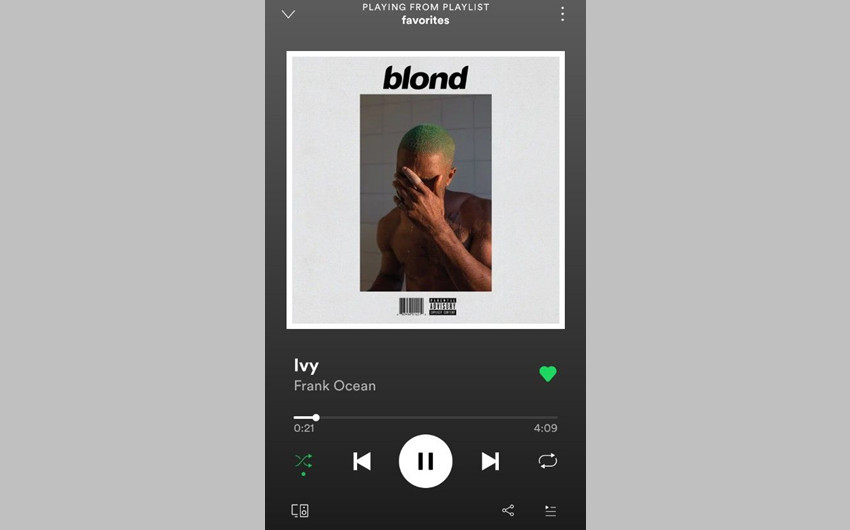Discover the Deep Meaning of “Ivy” by Frank Ocean
Frank Ocean’s song “Ivy,” from his album Blonde, captures the complexities of young love, heartbreak, and self-reflection. With its minimalist guitar and raw vocals, “Ivy” resonates deeply, portraying both nostalgia and personal growth in a way that feels universally relatable.
Many listeners find themselves drawn to the song’s emotional layers, seeking to understand the deeper meaning behind “Ivy” by Frank Ocean. Exploring this song’s themes opens up a conversation about love’s lasting impact, the power of memories, and the personal growth that often comes from heartbreak. This article dives into the themes and symbolism that make “Ivy” so captivating.
Overview of the Song “Ivy”

Image source: Pinterest
Background of the Song
“Ivy” is the second track on Frank Ocean’s critically acclaimed 2016 album, Blonde. Known for its deeply emotional and introspective lyrics, Blonde marked a stylistic shift for Ocean, moving away from the more structured R&B beats of his earlier work into a raw, unfiltered exploration of personal themes.
“Ivy” serves as an early emotional anchor for the album, setting a reflective tone that draws listeners into Ocean’s world of love, regret, and the lingering effects of past relationships. The song has been widely praised for its honesty and vulnerability, appealing to fans who appreciate Ocean’s ability to communicate complex emotions.
Musical Composition
The song’s musical composition is minimalistic, yet hauntingly effective. Produced by Frank Ocean and Om’Mas Keith, “Ivy” primarily features a clean, distorted electric guitar riff that carries a nostalgic, almost dreamlike quality. The stripped-down instrumentation allows Ocean’s voice and lyrics to take center stage, amplifying the emotional weight of the song.
Ocean’s vocals are layered and occasionally distorted, mirroring the raw and imperfect nature of the song’s subject matter. This choice of production gives “Ivy” a sense of intimacy, as though the listener is being invited into Ocean’s private thoughts. The echoing vocals and sparse guitar create a space for reflection, enhancing the song’s introspective tone.
Themes and Lyrics Analysis
In “Ivy,” Frank Ocean explores a series of interconnected themes that delve deeply into the emotional aftermath of a young, intense relationship. Ocean’s lyrics reflect universal feelings of love, heartbreak, regret, and personal growth, resonating with listeners who have experienced the lingering complexities of past relationships. Each theme in “Ivy” reveals a facet of Ocean’s personal journey, blending raw honesty with poetic reflection.
Nostalgia and Reflection
The theme of nostalgia permeates “Ivy,” as Ocean reflects on the vivid memories of a love that has since ended. The lyrics are steeped in a bittersweet longing, capturing the sense of innocence and idealism that often accompanies young love.
Ocean’s opening line, “I thought that I was dreaming when you said you loved me,” highlights his initial disbelief and awe, setting the stage for a love that felt almost too good to be true. This line also conveys the surreal quality of memory, as if Ocean is reliving the relationship in a dreamlike state, where everything is both clear and elusive.
Throughout the song, Ocean grapples with the passage of time, illustrating how powerful and lasting some memories can be, even when a relationship has ended. The nostalgia in “Ivy” is not purely romanticized; it is laced with the sorrow of knowing that the relationship is over. This reflective tone resonates with listeners who understand the weight of holding onto memories of a past love that, despite fading, still feels present in one’s heart.
Love and Heartbreak
At its core, “Ivy” is a song about the dual nature of love and heartbreak. Ocean’s lyrics portray the intensity and passion of young love while also delving into the pain and disillusionment that comes with its loss.
The line, “We’ll never be those kids again,” speaks to the innocence that was lost in the relationship, marking the inevitable transition from youthful idealism to a more grounded, sometimes painful, reality. This acknowledgment of lost innocence underscores the heartbreak of realizing that certain experiences and feelings cannot be relived or replaced.
Ocean’s chorus, “I could hate you now; it’s quite alright to hate me now,” reflects the complicated feelings that often accompany heartbreak. There’s a sense of forgiveness embedded in the line, as if he accepts that both he and his partner were flawed, and that mistakes were made.
This mutual acceptance of fault adds emotional depth, showing how love can endure even through bitterness and resentment. Ocean’s approach to heartbreak in “Ivy” is nuanced and mature, embracing the fact that love and loss are often intertwined.
Regret and Growth
Regret is another prominent theme in “Ivy,” as Ocean reflects on the choices and moments that shaped the relationship. The lyrics reveal a sense of introspection, with Ocean acknowledging the ways he may have contributed to the relationship’s downfall.
Lines like “If I could see through walls, I could see you’re faking” suggest a yearning to have understood his partner more deeply, hinting at missed signs and unspoken truths. This regret, however, is balanced with a sense of growth, as Ocean seems to accept the lessons that came from the experience.
As the song progresses, it becomes clear that Ocean is no longer the person he was during that relationship. His journey from infatuation to regret to acceptance represents the emotional evolution that often follows a deep connection.
This theme of growth is subtly woven into the lyrics, as Ocean’s reflections reveal a shift in perspective. By the end of the song, he appears to have gained a clearer understanding of himself and his relationships, illustrating how heartbreak can be a catalyst for personal development.
The Complexity of Letting Go
One of the most profound aspects of “Ivy” is its exploration of the difficulty in truly letting go of someone who once held significant meaning. Ocean uses the lyrics to express how past relationships can linger, impacting future experiences and perspectives.
The phrase, “I thought that I was dreaming,” repeated throughout the song, reinforces the dreamlike quality of memories and how past love can continue to feel close, even after it’s ended. This sense of attachment, coupled with Ocean’s acknowledgment that “We’ll never be those kids again,” emphasizes the pain of moving on.
The struggle to let go is further highlighted by the song’s tone, which mixes tenderness with melancholy. Ocean seems to accept that while the relationship is over, its effects are still deeply embedded in him. This complexity resonates with listeners who know that letting go is not always a clean break; past relationships can shape and influence us long after they’ve ended.
Symbolism of “Ivy” in the Song

In “Ivy,” Frank Ocean uses the plant as a powerful metaphor for attachment, memory, and emotional entanglement. Ivy is known for its tendency to cling tightly to surfaces, mirroring how memories of a past relationship can take root and persist long after the connection has ended. Ocean’s choice of “Ivy” as the title highlights how these memories, like the plant, can continue to grow within us, impacting our thoughts and emotions in ways both beautiful and challenging.
Attachment and Memory
The ivy plant symbolizes the attachment and lingering presence of past relationships. Ivy’s ability to spread and cling to surfaces reflects how memories of young love, despite the passage of time, remain vividly present. This attachment, embedded in Ocean’s lyrics, shows how certain experiences continue to shape our inner world.
Growth and Entanglement
Ivy also represents growth intertwined with entanglement. As ivy expands, it can both beautify and overwhelm, just as intense relationships can foster personal growth while leaving emotional scars.
Ocean’s lyrics, especially lines like “We’ll never be those kids again,” reveal a nostalgic recognition of change, where growth is inevitable but often comes with loss.
The Difficulty of Letting Go
Ivy’s clinging nature underscores the struggle to let go of past love. Just as ivy is difficult to remove once rooted, the memories and emotional hold of a former relationship can persist, showing up uninvited in Ocean’s mind.
This resilience of ivy, both endearing and haunting, captures the challenge of moving on from something that has become part of one’s identity.







